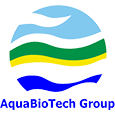Pond Aquaculture
Ponds can be operated as flow-through systems, but they can also be closed during the cultivation phase. Ponds are used for the intensive, extensive, or semi-intensive cultivation of fish. In some regions of Southeast Asia, the nutrient outputs from animal farming are used as a fertiliser for in-pond primary production, providing a food source for the cultivation of herbivorous fish. This is sometimes supplemented with homemade aquafeed formulated from ingredients such as bran (wheat or rice) and molasses. Marine species can be cultivated in coastal ponds containing water that is pumped from the sea on a regular or continuous basis. In some cases, fish are grown within small nets, called hapas, placed within the pond. Hapas are often used to produce species such as milkfish and tilapia.
Following harvesting, ponds are emptied, with the water either being discharged directly into the surrounding environment or used as an input to the cultivation of terrestrial crops. Water discharged from ponds may represent a point source of pollution when they contain a high level of nutrients, but this is not always the case. The nutrient concentration of discharged water may be the same, or even lower, than those of receiving water bodies. Pond sediments can be rich in nutrients, and they are often used as an agricultural fertiliser. Farmers who adopt good aquaculture practices and intensified production have high productivity and positive profits.
AquaBioTech Group offers a range of services for pond farming including:
- Site selection
- Pond Zoning Studies
- GIS modeling of suitable sites for pond aquaculture
- Environmental and Social Impact Assessment (ESIA)
- Life Cycle Assessments
- Species Selection
- Culture Techniques
- Farm management services
- Water Quality Management
- Pond Design / System Design
- Biosecurity Assessments
- Feeding Management Strategies
- Engineering services
- Installation; Including Third-Party Quality Control
- Commissioning and Technical Training
- Operational and management support on existing farms
- Governance and Policy Support

